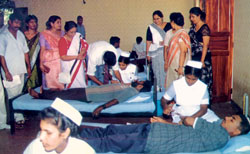|
DAILY NEWS ONLINE |
|
|
|
OTHER EDITIONS |
|
|
|
|
|
|
|
|
|
OTHER LINKS |
|
|
|
|
|
|
 |
Light up a life with a gift of blood
Those who donate their blood do it on their own freewill without expecting any reward, but with compassion to help save another person's life. The accessibility of safe blood for patients who require blood transfusion depends on the extraordinary generosity of those who donate it. Therefore, the officials of the Blood Bank wish to create awareness of the importance of voluntary blood donation and to make an appealing invitation to the healthy general public to become regular donors. Safe blood saves lives. Blood is commonly used for women with complications of pregnancy, i.e., Ectopic pregnancies and haemorrhage before or during child birth, children with severe anaemia often resulting from malaria or malnutrition, accident victims and surgical and cancer patients and those with hereditary blood disorders such as thalassaemia and haemophilia. There is a constant need for a regular supply of blood because it can be stored only for a limited period of time before use - platelets for 5 days only. Therefore regular blood donation by a sufficient number of healthy people is needed to ensure that blood will always be available whenever it is needed. Voluntary blood donors * Voluntary, non-remunerated blood donors are those who give blood, plasma or other blood components of their own freewill and receive no payment or remuneration for it. * Only 25% of all voluntary, non remunerated blood donations are collected in developing countries. * In high income countries, 94% of donations are given by voluntary non-remunerated blood donors. * In low and middle income countries, over 43% of donations by new blood donors are still given by paid or family/replacement donors. * Only 39 countries have achieved 100% voluntary blood donations. The proportion of the population with infectious diseases (HIV/Hepatitis) depends on the number of the people who are eligible to donate blood. There is a rise in collections as the need is increasing. Improvements * 100% VNRRB donation * Increase in annual collection * Computerized donor database * Rare donor registry * Aphaeresis technology for platelet availability * Antilogous transfusion (collection of blood from the patient for his or her own requirement) Irrespective of the reason why you donate blood for the first time or if you are a regular donor, the blood service must make sure that no harm can be caused to you by donating blood. Also, they must check whether your blood will be safe for the person who receives it. Therefore, you will be asked some queYou will only be accepted as a blood donor if you are fit and well. Your health and well-being are very important to the blood service. As the needle and blood bag used to collect blood come in a sterile pack which cannot be re-used, there are no chances of infection through the process. You can donate blood if you are: * Between 18-60 years * More than 50 kg * Healthy * Have not donated blood during the last 4 months You should not donate blood if you are - * Feeling unwell * Anaemic * Pregnant or have been pregnant within the last year * Have certain medical conditions, viz. heart diseases, low or high blood pressure, diabetes, epilepsy * Taking certain medications, viz. antibiotics You may be able to donate blood later. Blood can transmit life-threatening infections to patients who receive blood transfusions. Therefore, you should not donate blood if you - * Have or may recently have contracted a sexually transmitted disease, viz., HIV or syphilis or infections - hepatitis, malaria, typhoid and other viral infections that can be passed on to a patient who receives your blood. * Lifestyle puts you at risk of contracting an infection that can be transmitted through your blood; if you have more than one sexual partner or have unsafe sexual contact with prostitutes * Have recently had a tattoo, skin scarification or ear or body piercing * Have had sexual contact with anyone in the above categories After collection, the blood undergoes testing for blood groups as well as for transfusion of transmissible infections. Until the test results are available, the blood is kept in quarantine. One unit of blood is used for more than one patient and the bag where blood is collected is interconnected with satellite bags permitting whole blood to be separated into various components. Platelets help to prevent and stop bleeding and are required for cancer and dengue patients. More of these are collected from one donor with the use of a cell separator machine. The Sri Lanka National Blood Transfusion Service is the main organization for collection and supply of blood and blood components. It is located at Narahenpita, Colombo 5.here is no substitute for blood and it cannot be produced artificially. Besides, blood products can be stored only for a limited period. More than that you are compassionate to all human beings!
|
|
|
 |
|||
 |
|||
|
|||
|
|
|||
 THE World Blood Day is celebrated worldwide, on 14th June, to honour
and thank those who donate their blood which is the most precious gift
of all-the Gift of Life, on a voluntary and unpaid basis.
THE World Blood Day is celebrated worldwide, on 14th June, to honour
and thank those who donate their blood which is the most precious gift
of all-the Gift of Life, on a voluntary and unpaid basis. 


